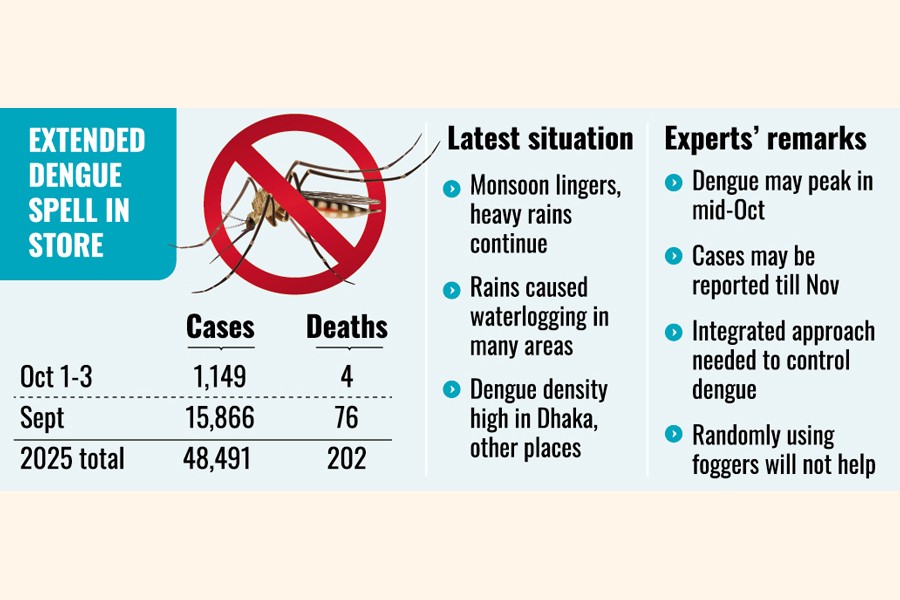
Published :
Updated :

Entomologists have warned that Bangladesh may see an extended outbreak of dengue fever this year, with cases doubling this month compared to September due to heavy rains.
The health authorities recorded 15,866 hospitalisations in September and 1,149 cases in just the first three days of this month.
Also, 76 deaths were reported in September, while four patients have already died in October.
The capital and other parts of the country have been witnessing heavy rains since September 30.
The Met Office has forecast that showers may continue till October 5 and then subside.
Rains have already caused waterlogging across Dhaka due to the poor drainage system and the decreasing number of waterbodies.
The city on Wednesday experienced this year's highest rainfall of 206 millimetres, resulting in waterlogging in various areas.
This year's rainy season has extended till October.
Rainfall washes away mosquito larvae and breeding habitats, while persistent waterlogging - exacerbated by inadequate cleaning and low public awareness - creates favourable conditions for Aedes mosquitoes to thrive.
Experts attribute the possible rise in cases and an extended outbreak this year to climate-change impacts.
Prof Kabirul Bashar, a medical entomologist and teacher at Jahangirnagar University, says they are conducting research and have found a high dengue density in Dhaka and other places, which can transmit the virus.
"There are three things here - environmental factors that favour dengue transmission, patients, and Aedes mosquitoes. We cannot control the environmental factors, such as the heavy rains we witnessed in the last couple of days," he says.
"However, we can control the remaining two. If we fail, we may see the dengue situation worsening in October," he says, adding that there will be a prolonged spell of the disease this year.
Prof Bashar also says, "We usually see dengue cases coming down in September and in some cases, in October. However, we fear that dengue could reach its peak in mid-October this year, and cases may be reported till November."
The entomologist, who has been in the field of mosquito research for a long period, says rains caused by changing weather patterns and climate change impacts remain the driving force behind the surge in dengue this year.
"Soon after the rains subside, cases may start increasing in October."
Prof Bashar emphasises community engagement to control dengue in Dhaka and elsewhere, explaining that they have found Aedes larvae on the upper floors of residential buildings, which usually remain out of the city corporations' reach.
"We have found dengue spreading in the basement and lower floors of buildings for various reasons, including the increasing tendency to wash cars in the basement. Because of this, water stagnates, which is conducive to the breeding of dengue mosquitoes," he adds.
The expert suggests an integrated approach to control the deadly disease, noting that randomly using foggers will not help.
The health authorities on Friday registered 263 new cases, bringing the total number to 48,491 this year.
According to the Directorate General of Health Services (DGHS), the number of deaths in 2025 remained at 202, as no new fatalities were reported on the day.
Last year, dengue claimed the lives of 575 people.
Currently, 2,301 patients are receiving treatment in hospitals across the country.
nsrafsanju@gmail.com


 For all latest news, follow The Financial Express Google News channel.
For all latest news, follow The Financial Express Google News channel.